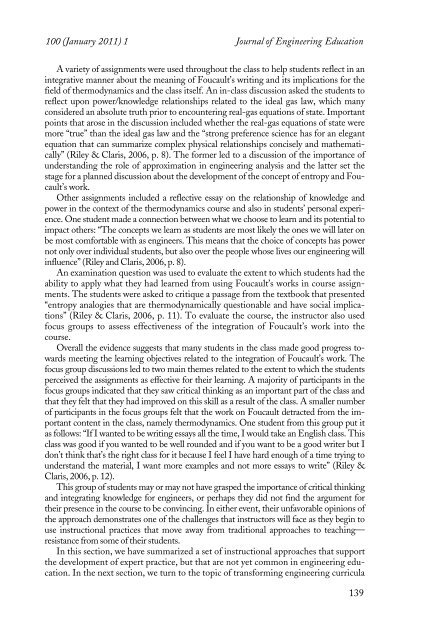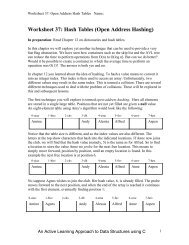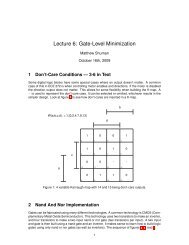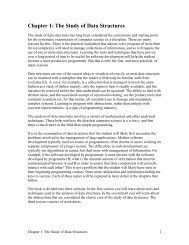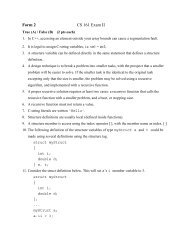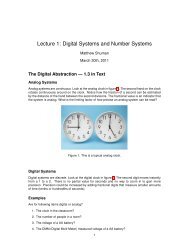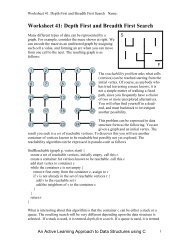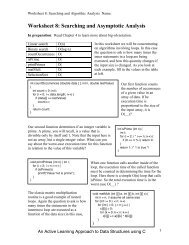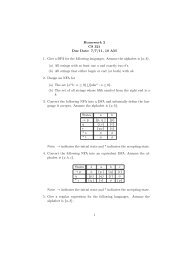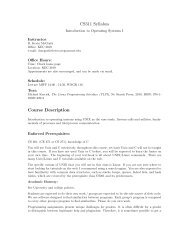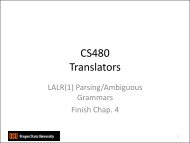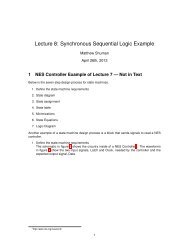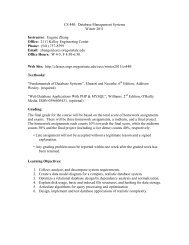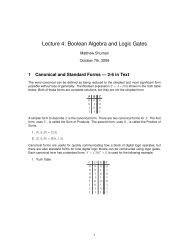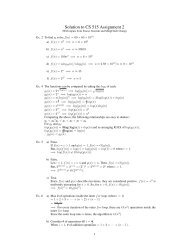Engineering Education and the Development of Expertise - Classes
Engineering Education and the Development of Expertise - Classes
Engineering Education and the Development of Expertise - Classes
Create successful ePaper yourself
Turn your PDF publications into a flip-book with our unique Google optimized e-Paper software.
100 (January 2011) 1 Journal <strong>of</strong> <strong>Engineering</strong> <strong>Education</strong><br />
A variety <strong>of</strong> assignments were used throughout <strong>the</strong> class to help students reflect in an<br />
integrative manner about <strong>the</strong> meaning <strong>of</strong> Foucault’s writing <strong>and</strong> its implications for <strong>the</strong><br />
field <strong>of</strong> <strong>the</strong>rmodynamics <strong>and</strong> <strong>the</strong> class itself. An in-class discussion asked <strong>the</strong> students to<br />
reflect upon power/knowledge relationships related to <strong>the</strong> ideal gas law, which many<br />
considered an absolute truth prior to encountering real-gas equations <strong>of</strong> state. Important<br />
points that arose in <strong>the</strong> discussion included whe<strong>the</strong>r <strong>the</strong> real-gas equations <strong>of</strong> state were<br />
more “true” than <strong>the</strong> ideal gas law <strong>and</strong> <strong>the</strong> “strong preference science has for an elegant<br />
equation that can summarize complex physical relationships concisely <strong>and</strong> ma<strong>the</strong>matically”<br />
(Riley & Claris, 2006, p. 8). The former led to a discussion <strong>of</strong> <strong>the</strong> importance <strong>of</strong><br />
underst<strong>and</strong>ing <strong>the</strong> role <strong>of</strong> approximation in engineering analysis <strong>and</strong> <strong>the</strong> latter set <strong>the</strong><br />
stage for a planned discussion about <strong>the</strong> development <strong>of</strong> <strong>the</strong> concept <strong>of</strong> entropy <strong>and</strong> Foucault’s<br />
work.<br />
O<strong>the</strong>r assignments included a reflective essay on <strong>the</strong> relationship <strong>of</strong> knowledge <strong>and</strong><br />
power in <strong>the</strong> context <strong>of</strong> <strong>the</strong> <strong>the</strong>rmodynamics course <strong>and</strong> also in students’ personal experience.<br />
One student made a connection between what we choose to learn <strong>and</strong> its potential to<br />
impact o<strong>the</strong>rs: “The concepts we learn as students are most likely <strong>the</strong> ones we will later on<br />
be most comfortable with as engineers. This means that <strong>the</strong> choice <strong>of</strong> concepts has power<br />
not only over individual students, but also over <strong>the</strong> people whose lives our engineering will<br />
influence” (Riley <strong>and</strong> Claris, 2006, p. 8).<br />
An examination question was used to evaluate <strong>the</strong> extent to which students had <strong>the</strong><br />
ability to apply what <strong>the</strong>y had learned from using Foucault’s works in course assignments.<br />
The students were asked to critique a passage from <strong>the</strong> textbook that presented<br />
“entropy analogies that are <strong>the</strong>rmodynamically questionable <strong>and</strong> have social implications”<br />
(Riley & Claris, 2006, p. 11). To evaluate <strong>the</strong> course, <strong>the</strong> instructor also used<br />
focus groups to assess effectiveness <strong>of</strong> <strong>the</strong> integration <strong>of</strong> Foucault’s work into <strong>the</strong><br />
course.<br />
Overall <strong>the</strong> evidence suggests that many students in <strong>the</strong> class made good progress towards<br />
meeting <strong>the</strong> learning objectives related to <strong>the</strong> integration <strong>of</strong> Foucault’s work. The<br />
focus group discussions led to two main <strong>the</strong>mes related to <strong>the</strong> extent to which <strong>the</strong> students<br />
perceived <strong>the</strong> assignments as effective for <strong>the</strong>ir learning. A majority <strong>of</strong> participants in <strong>the</strong><br />
focus groups indicated that <strong>the</strong>y saw critical thinking as an important part <strong>of</strong> <strong>the</strong> class <strong>and</strong><br />
that <strong>the</strong>y felt that <strong>the</strong>y had improved on this skill as a result <strong>of</strong> <strong>the</strong> class. A smaller number<br />
<strong>of</strong> participants in <strong>the</strong> focus groups felt that <strong>the</strong> work on Foucault detracted from <strong>the</strong> important<br />
content in <strong>the</strong> class, namely <strong>the</strong>rmodynamics. One student from this group put it<br />
as follows: “If I wanted to be writing essays all <strong>the</strong> time, I would take an English class. This<br />
class was good if you wanted to be well rounded <strong>and</strong> if you want to be a good writer but I<br />
don’t think that’s <strong>the</strong> right class for it because I feel I have hard enough <strong>of</strong> a time trying to<br />
underst<strong>and</strong> <strong>the</strong> material, I want more examples <strong>and</strong> not more essays to write” (Riley &<br />
Claris, 2006, p. 12).<br />
This group <strong>of</strong> students may or may not have grasped <strong>the</strong> importance <strong>of</strong> critical thinking<br />
<strong>and</strong> integrating knowledge for engineers, or perhaps <strong>the</strong>y did not find <strong>the</strong> argument for<br />
<strong>the</strong>ir presence in <strong>the</strong> course to be convincing. In ei<strong>the</strong>r event, <strong>the</strong>ir unfavorable opinions <strong>of</strong><br />
<strong>the</strong> approach demonstrates one <strong>of</strong> <strong>the</strong> challenges that instructors will face as <strong>the</strong>y begin to<br />
use instructional practices that move away from traditional approaches to teaching—<br />
resistance from some <strong>of</strong> <strong>the</strong>ir students.<br />
In this section, we have summarized a set <strong>of</strong> instructional approaches that support<br />
<strong>the</strong> development <strong>of</strong> expert practice, but that are not yet common in engineering education.<br />
In <strong>the</strong> next section, we turn to <strong>the</strong> topic <strong>of</strong> transforming engineering curricula<br />
139


